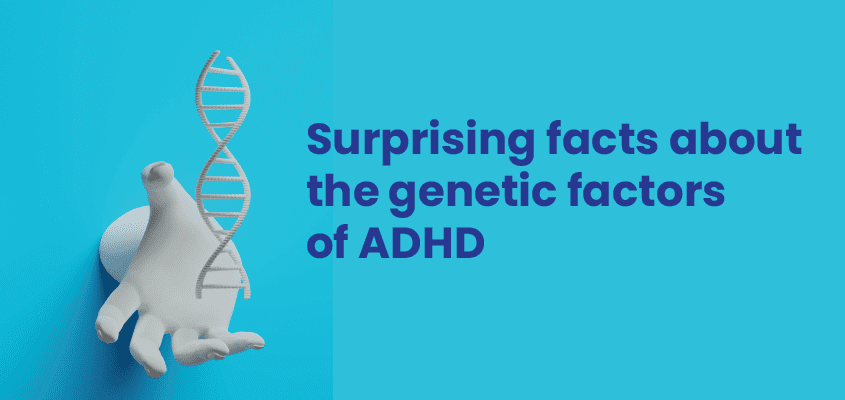Introduction
ADHD symptoms are widely identified early on and may worsen as the child’s environment changes, such as when they start school. The majority of cases of ADHD are found in children as young as 12 years old or below, but occasionally it is found in children who are still in early childhood. Sometimes, adults with ADHD receive a diagnosis because they did not receive one as children. Although many adults who received an ADHD diagnosis when they were children still struggle, the symptoms usually lessen with age. This blog post will explore different facets of ADHD and its connection with genetics.
Genetic factors of ADHD
The hallmarks or symptoms of ADHD, which is a developmental disorder that impairs daily functioning, are:
- Inattention
- Impulsivity
- Hyperactivity
Neurobehavioural syndromes like ADHD have been analyzed by medical science for decades. (1) Researchers can conclude that a genetic factor is at play despite no definitive solution. It is an important discovery because ADHD affects people almost everywhere. The fact that ADHD is a treatable condition is essential. When a child exhibits disorder symptoms, it is only natural to turn to the father because there could be a genetic connection. Individuals can encourage one another and face daily difficulties as a team.
What studies suggest about genetic factors of ADHD
(2) According to Russell Barkley, a pioneer in the field, fathers with ADHD are in the spotlight since the disorder affects boys more frequently than girls on a spectrum of 3 to 1. Another study by the National Center for Biotechnology Information (NCBI) states that since ADHD has a formal heritability of about 80%, it is more heritable than most other psychiatric conditions. Although the inheritance pattern is typically unknown, ADHD has the propensity to run in families. Compared to the general population, the likelihood of developing this condition is about nine-fold greater for first-degree relatives of individuals with ADHD, such as siblings or offspring. When ADHD is a trait of some other genetic syndrome, that syndrome’s inheritance pattern may apply to how ADHD is passed on. It is essential to know that uncommon genetic mutations or congenital anomalies less frequently bring ADHD. In these situations, ADHD is typically one of several disease symptoms that affect various body systems. A mutation in just one gene is usually sufficient to cause ADHD in people with rare gene mutations responsible for the disorder.
Is it True That Genes are Associated with ADHD?
Studies on the genetic factors of ADHD suggest that several genes work together to develop this complex disorder. Many now acknowledge that ADHD is polygenetic, which may be caused by several genes with only modest effects.
(3) According to a study by the NCBI, a dopamine D4 receptor gene VNTR, and a dopamine D5 receptor gene microsatellite marker are consistently linked to ADHD. More recent evidence from numerous studies and a consolidated evaluation suggests that the COMT Val158/108 Met variant affects conduct issues in people with ADHD. Some genes associated with dopamine regulation in the brain are among the 25 to 45 genes Russell Barkley claims are high-candidate genes for ADHD. Numerous studies examining the genetic factors of ADHD have been released in recent years. The number of such studies is anticipated to rise over the coming years, mainly as new genetic technologies such as next-generation sequencing are developed.
The role of environment in genetic factors of ADHD
Environmental risk factors are strongly linked to ADHD diagnoses, so the environment may also contain elements contributing to ADHD. These factors may include the following:
- Exposure to substances or chemicals while pregnant
- Premature birth or low birth weight
- Toxins in the environment; diseases such as bacterial infection
- Encephalitis
- Injury to the frontal lobe of the brain, which governs impulses and emotions
According to studies, pregnant women who smoke or drink heavily may increase their child’s risk of developing ADHD. A contributing factor could be lead, PCB, and pesticide exposure. Some toxins, according to researchers, may prevent proper brain development. According to them, this might result in hyperactivity, impulsive behavior, and difficulty paying attention.It is indeed unclear to researchers what the underlying cause of ADHD is, which is most likely because more than one factor interacts to cause ADHD.
How do genetic factors affect ADHD?
(4) Neurotransmitters, which are chemicals in the brain, do not function the same way in children and adults with ADHD, according to studies. Additionally, there are regular variations in how nerve pathways function. Children with ADHD may have smaller or less active brain portions than those without. The available data indicate that ADHD is a genetic condition transmitted from parent to child. Children with ADHD are born to at least one-third of all fathers who experienced the disorder as children. Additionally, most sets of identical twins exhibit the ADHD trait. Brains with ADHD differ structurally and functionally. The brain cells of children with ADHD mature more steadily than those of other children, according to scans and other neuroimaging studies. Recent imaging studies have revealed variations in the brain regions responsible for many ADHD symptoms. Several brain areas and structures, including the prefrontal cortex, striatum, basal ganglia, and cerebellum, tend to shrink by about 5% in children with ADHD.
Treatment methodologies for ADHD
The type of treatment for ADHD depends on the symptoms. However, a review of the literature suggests that it typically consists of a mix of:
- Medications: Medication for ADHD patients may include stimulants to control impulsive behaviour and non-stimulants to improve memory and attention.
- Psychotherapy: People with ADHD who receive counseling can learn more effective coping mechanisms for stress, maintaining interpersonal relationships, and navigating social situations.
- Behaviour control: With the help of behavioral therapy, someone with ADHD can improve their positive behaviours and lessen their negative ones. They may proceed to perform better in their academic, professional, and social lives.
- Upskilling social and organizational abilities: Training in social and organizational skills may benefit people with ADHD. Therapies involving social and organizational skills may include applied behavioural analysis (ABA), occupational, and behavioral-cognitive therapy.
Conclusion
Studies on the genetic factors of ADHD suggest that several genes work together to develop this complex disorder. So it can be established that the genetic characteristics of ADHD are relevant. But it is always important to remember that ADHD is a treatable condition.
References
- NHS, “Causes – Attention deficit hyperactivity disorder (ADHD),” NHS, Dec. 24, 2021. https://www.nhs.uk/conditions/attention-deficit-hyperactivity-disorder-adhd/causes/
- J. C. Fodstad, J. Rojahn, and J. L. Matson, “The Emergence of Challenging Behaviors in At-Risk Toddlers with and without Autism Spectrum Disorder: A Cross-Sectional Study,” Journal of Developmental and Physical Disabilities, vol. 24, no. 3, pp. 217–234, Jan. 2012, doi: https://doi.org/10.1007/s10882-011-9266-9.
- M. M. Martel, M. Nikolas, K. Jernigan, K. Friderici, I. Waldman, and J. T. Nigg, “The Dopamine Receptor D4 Gene (DRD4) Moderates Family Environmental Effects on ADHD,” Journal of Abnormal Child Psychology, vol. 39, no. 1, pp. 1–10, Jul. 2010, doi: https://doi.org/10.1007/s10802-010-9439-5.
- L. Silver, “The Neuroscience of the ADHD Brain,” ADDitude, Sep. 07, 2017. https://www.additudemag.com/neuroscience-of-adhd-brain/





